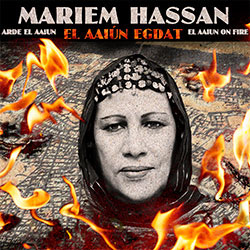
En el año 2012 Mariem Hassan imprime un giro a su propuesta musical. Los acontecimientos de los últimos meses, conocidos como la “Primavera Árabe”, y la incombustible lucha del pueblo saharaui por la independencia, marcan la temática de sus nuevas canciones.
Paralelamente, su música, manteniendo firmes sus bases en el haul, se acerca al blues, al jazz y a sonidos contemporáneos como nunca lo había hecho un artista del Sáhara Occidental.
El Aaiún Egdat(Arde El Aaiún), que así se llama el CD, plasma esa visión actual y renovada. En él, la diva saharaui está acompañada por Vadiya Mint El Hanevi a los tebales y coros, por Luis Giménez a la guitarra eléctrica, mbira y armónica, por Hugo Westerdahl al bajo, y por Gabriel Flores al saxo y flautas.
A estos tres músicos les une su amor y conocimiento de la música saharaui. El alicantino -de Villena- Luis Giménez, conoció las gamas saharauis hace ya años en los campamentos de refugiados, hasta el punto que realizó un documental sobre el haul: “Los mares del desierto”. El mexicano Gabriel Flores es el director externo de Enamus, la escuela de música saharaui, inaugurada el pasado noviembre en el campamento de refugiados “27 de febrero”. El canario Hugo Westerdahl ha visto pasar por su estudio Axis a un sin número de músicos y cantantes saharauis que allí han grabado para Nubenegra. Su interés por el haul queda patente en el CD Western Sahara, dedicado al recordado guitarrista Baba Salama.
El Aaiún Egdat es, ante todo, una obra muy abierta, tanto en su temática como en su expresión. El haul sigue siendo el motor fundamental. Las piezas más candentes, como la que presta título al disco, o las dos referidas al campamento de Gdeim Izik, a la Primavera Árabe o La victoria, están firmadas por prestigiosos poetas del exilio saharaui, como Beibuh, Bachir Ali o Lamín Allal. La lacerante voz de Mariem Hassan señala la gravedad del momento con toda la emoción que su garganta y su corazón son capaces de transmitir.
Otros temas nos presentan a una Mariem mucho más dulce. Nunca la habíamos oído cantar como lo hace en “Ana saharauia” (Soy saharaui), auténtica declaración de principios. O como en “Descansen en paz”, con la jaima teñida de jazz bajo la luz cálida de la luna del desierto. Y muy dinámica, enarbolando “La melfa” que dos años atrás quisieron mancillarle en Madrid. Punto y aparte merece “El legado” en la que la tradición y la modernidad libran una incruenta batalla que, sin duda, dará que hablar. Señalemos también el homenaje a Ali Farka Touré que Mariem le rinde en “Yalli mashi anni”.
Mariem, de nuevo, comprometida y genial. Un placer,
P.S. En iTunes al comprar el CD completo recibirás un tema exclusivo para iTunes de Mariem: “Almara” (Mujer).
ENGLISH:
In 2012 Mariem Hassan gives her music a new twist. The events of the last months, the "Arab Spring" and the indomitable Sahrawi struggle for independence, are the subjects of her new songs. Rooted in the bases of the Haul, Mariem explores blues, jazz and contemporay sounds as no other Sahrawi musician ever has.
The album, El Aaiún Egdat (El Aaiún on Fire) embodies her fresh stylistic exploration. The Sahrawi diva is accompanied once again by Vadiya Mint El Hanevi, on tebals (drums) and choruses, by Luis Giménez on electric guitar, mbira and harmonica, by Hugo Westerdahl on bass, and Gabriel Flores on saxophone and flutes.
The group is bounded by their love and knowledge of the music of Western Sahara. The Alicantino from Villena, Luis Gimenez, first heard the scales and the rhytms of the Haul music during his visit in the refugee camps some years before, which inspired his documentary The seas of the desert. Gabriel Flores from Mexico, is one of the directors of Enamus, the first national music school in the Sahrawi refugee camp "February 27". Hugo Westerdahl, from the Canarian islands, met many musicians from Western Sahara while they were recording their albums for the label Nubenegra in his studio AXIS. This experience infected him with an interest in the haul music, eventually bearing the album Western Sahara,"in memory of the Sahrawi guitarist, Baba Salama, who died in 2005.
On her new album, Mariem integrates divergent themes and musical expressions into her traditional rhythms driven by the haul. Most arresting perhaps are the tracks El Aaiún Egdat, the two songs that refer to the Gdeim Izik camp, the Arab Spring or the Victory, whose verses are written by renowned Sahrawi poets in exile: Beibuh, Ali Bachir and Lamin Allal. Mariem's voice signals the seriousness of the moment with all the passion only her throat and her heart can transmit.
Other tracks, such as "Ana Saharauia" (I'm Sahrawi) - a reaffirmation of her identity - and The Martyrs Rest in Peace - a jazz-tinged vision of the jaima (Sahrawi tent) tranquil beneath the warm moonlight in the desert – reveal a sweeter side to the lacerating vocals Mariem has offered us in the past. Singular are also "Melfa", about her traditional clothing, and "The Legacy" which offers Mariem´s perspective on the bloodless battles between tradition and modernity with which her culture has always grappled.
The quintet of Mariem Hassan will begin touring in spring 2012 El Aaiún On Fire.